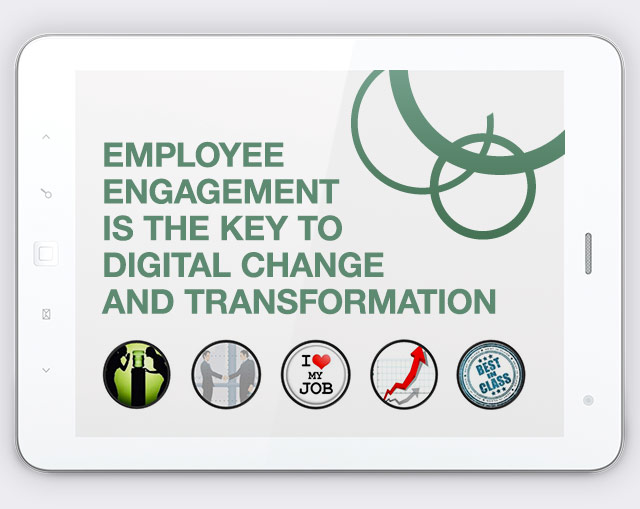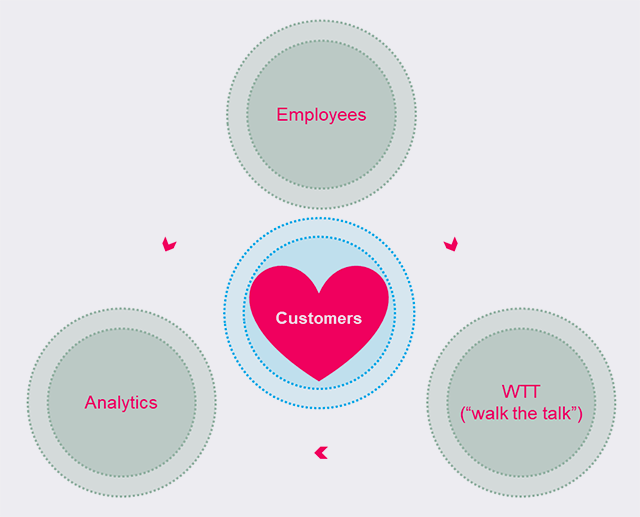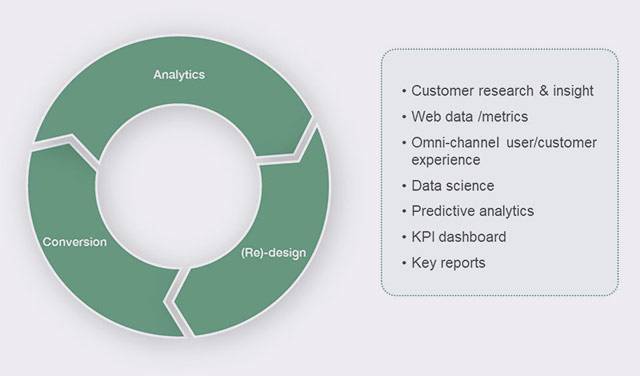
Employee engagement is the key to digital change and transformation
In these transformation times, when Digital & Data Tech are driving so much change and opportunity, what can make the difference in achieving success? What key factors are emerging that show how winning companies can succeed, how the various challenges with delivering change can be met and overcome, how an organisation can develop to be a Digital & Data winner.
The research is showing that a key driver is Employee Engagement. It’s about enabling and mobilising and empowering and exciting the workforce to engage wholeheartedly with the transformation programme, to get involved in it with enthusiasm, instilling a belief that this effort and their personal contribution can lead to success.
Companies like 3M, Zappos, Virgin, Red Hat, Nationwide Building Society, LV Insurance, Adobe, Home Depot, Procter & Gamble, South West Airlines and others are leading the way in this respect. They are showing that:
Employee Engagement = Customer Happiness = Market Success.
Let’s look at some initial stats around this whole area:
- Sasser & Reichheld at Harvard Business School found that “employee engagement” was the key to driving customer satisfaction and hence market success. Their research showed that through employee engagement, if that drove a 5% increase in customer loyalty then that could increase profits in the company by as much as 25%.
- McKinsey found that c.70% of all customer buying decisions are based on how well they are treated by the organisation and its employees
- Gallup Consulting discovered that high employee engagement companies grow their earnings per share (“EPS”) at a faster rate of 28% while low employee engagement firms experienced an average EPS decline rate of 9.4%.
- The Center for Human Resources Strategy at Rutgers University found that businesses with highly engaged workforces were on average 3.4x more effective financially in terms of sales and revenue growth
We can also consider some overview case study examples:
Virgin: “At Virgin, we do not put the customer first. It’s Virgin employees who are the company’s top priority. That may sound like a decades-old business wisdom, but it works. If the person who works at your company is 100 per cent proud of the Brand and you give them a good job and they’re treated well, they’re going to be happy and they’re going to make the customers pleased too”
-interview with Richard Branson
Red Hat: “I have never seen a company of this size where the people are so passionate”
-quote from annual CIO.com customer survey
Zappos: “We hire talent whose personal values align with the company’s core values. Our employees are encouraged to have a genuine interest in helping others. We’re proud that they say they feel inspired. They say they are able to fulfil a higher personal purpose at work by being enabled to live out their own values very day. Great benefits and a workplace that is fun and dedicated to making customers happy all fit in with the Zappos approach to company culture – when you get the company culture right, great customer service and a great Brand will happen on its own. Change becomes easy!”
Gary Hamel: Business School Professor: “To put it bluntly, the most important task for any manager today is to create a work environment that inspires exceptional contribution and that merits an outpouring of passion, imagination and initiative”.
Southwest Airlines: “We’ve been in operation for more than 50 years and during all that time we have looked to communicate our goals and vision to our employees in a way that will make them feel part here of a unified team. We want our people to be convinced of a larger common goal and to be excited by that. In that way we believe they will feel empowered to go the extra mile to make our customers happy”
These case studies and research show that there is a key underlying model at work underpinning this employee engagement success. It’s not just nice words, it’s not simply some top-down statement of intent, it’s not simply yet another initiative to try to build-up the company. It is something much more fundamental, that’s root and branch and becomes the DNA as to how people think, work and collaborate across the organisation:
The Employee Engagement Model

Nationwide
Nationwide has over 15 millions members/customers across the UK. It is the second largest UK Bank in terms of consumer savings and mortgages with assets of more than £200bn.
It has consistently been ranked among in the top 5 best big companies to work for, has been voted No.1 UK Bank by Business Insider, has been the Which? Banking Brand of the Year and described in a consumer survey as: “the most trustworthy, straightforward, helpful and friendly Bank” (Good Housekeeping).
Joe Garner, an ex P&G person, is the CEO there. He talks in this way about how Nationwide is organised and managing continuous change:
“We have a mission to build a trusted community of customers and employees…customers stay with us because of our record of outstanding customer services… that’s being given every day by our staff and it is at the heart of what we do.
“Underpinning our success is our recognition of our employees. There is a sense of Pride that runs through the whole organisation so that our employees want to serve our customers in the best possible way.
Nationwide has established a range of employee benefits which include time off for local charity volunteer work, everyone eligible for the pension scheme and a minimum 4% employer contribution, free healthcare for employees and their family, flexible working including part time, flexi time, school term time only and home /remote working, minimum 24 days holiday for all, vouchers /employee rewards each week for work well-done, celebrations of employees “who go the extra mile” with their stories published for all to read, long service awards…employees feel valued and their efforts recognised.
Supporting this are detailed customer analytics. There’s a substantial investment in understanding the key customer metrics, what is working and what is not and at a detailed level by branch, by department, by team so that good performance can be immediately identified and any areas needing improvement can quickly get attention. The data available is increasingly in real-time so no need to wait for a report to come through from IT at the end of a month or quarter, the areas of opportunity are easily visible.
And as the key that keeps all these good things in place, Joe Garner is a very good example of a business leader who walks the talk. Joe talks about the “courage to care” (and see later chapter), the desire to do the right thing by staff and customers, the goal of building a caring environment where staff can flourish and change can be delivered. He cascades these messages throughout the organisation all the time. He also holds regular “town hall” meetings where progress is shared and success celebrated. “There’s a level of openness and transparency at Nationwide that I’ve not seen anywhere else” -employee comments on glassdoor.co.uk).
LV Insurance
LV is one of the UK’s largest insurance companies with more than 5 million customers and offering a range of personal and life insurance, pension and savings.
It has been voted “best loved insurer” 5 yrs running, it has been rated by Moneywise as “most trusted insurer” and has won best life and pensions provider 8x by Moneyfacts.
CEO Richard Rowney talks in these terms: “Our goal is to help customers, members and colleagues feel more confident about life and more confident in us. We have a strong customer service ethos. They are at the centre of what we do. We know we have to keep evolving and improving and taking advantage of new technologies in a way that’s helpful to us and to our customers and not to replace the tried and tested. Companies like Amazon and John Lewis set the bar for what customers expect and we need to keep investing and building. So we are always trying to improve our employee experience, recognising that great customer experience starts from the inside out.”
Like Nationwide, LV too have a generous array of employee benefits to help their staff engage. Everyone is eligible for the LV bonus scheme, all are able to participate in the pension plan up to a 14% matched contribution, there are coffee cards for new joiners, healthcare, holidays for top-performing employees and their families, weekly thank you cards and gift vouchers with more than 23,000 sent out in the last year (workforce of 5000), flexible working, crowdsourcing /funding plans for new ideas, a customer leadership academy…a lot of effort going in to make employees feel valued and motivated.
LV also have underpinned these efforts with a detailed customer analytics capability that continuously measures customer and employee engagement. As their Head of Analytics points out:
“we are now able to analyse the experience of our customers at a collective as well as at an individual level so that we can continue to shape and improve that experience. We can engage in real-time 1-1 as well as identifying an ongoing programme of change and improvement”.

Richard Rowney is also a keen advocate of “walking the talk”. He talks about wanting to: “build the culture to make everybody around feel welcome and looking to help each other. We like to encourage that especially. There’s lots of communication at LV as well and I expect all my mangers to be out there walking around talking to people. We care here about our staff and members and it can be seen constantly”.
South West Airlines
Founded in 1967, SWA has become the largest domestic US airline. Revenues exceed $21bn. They have now recorded their 45th consecutive year of profitability (while some once rival carriers have either merged or reported continued trading difficulties). The share price is up 3x over the past 5yrs.
SWA has been named for the 24th straight year as one of Forbes Most Admired Companies. They are consistently ranked No. 1 Airline for customer satisfaction, have been voted “one of the best employers to work for” in glassdoor polls for the 9th year running, named in the top 100 for Corporate Responsibility and voted best US Airline for 8 consecutive years.
This is a company that completely subscribes to the mantra that employee engagement drives customer satisfaction= market success. In the company’s annual report, the first thing that CEO Gary Kelly says is: “I want to thank our people for our exceptional results and congratulate them. Our strong financial performance provides the cash flow to continue to reward our employees…and so deliver more value to our customers”. SWA announced it would share $586m of its profits with its 54,000 workforce, making an average bonus payout of 13.2% or the equivalent of 6 weeks pay.
“Our people-first approach has guided our company since it was founded and it means when our company does well, our people do really, really well. Our people work incredibly hard and deserve to share in Southwest’s success.”
As pointed out in a recent Forbes review of the company, SWA has never laid anyone off or cut pay. They have long been lauded for their strong workplace culture and engaged workforce. They work hard to get employees to think and act like owners and by sharing the profits they are able to make a substantial statement of intent. “The real secret to Southwest’s success is having one of the most highly motivated and productive work forces in the world. They are motivated by a sense of fairness that says: We want your well-being [as an employee] to be tied to the company’s well-being because, after all, you are the company.”
For SWA, analytics has also always been a key part of how they manage and measure performance. They have been described as a “big data company” long before IBM pioneered big data teams. And the aim of investment and building the analytics capability has always been around improving and delivering the highest quality of customer service.
The goal today is to establish a “self-serve” analytics culture enabling employees to get information themselves in real-time and so be able to respond immediately. So front-line personnel receive real-time KPI dashboards related to operational and strategic goals. They can use voice commands to eg extract information out of live-recorded interactions between customers and staff. They can monitor and review social media data to check on performance and what customers are saying and intervene immediately to fix an issue or capture a customer booking. The whole purpose is to drive higher customer conversion through employees able and willing and wanting to make a positive impact and contribution (and being rewarded accordingly). “Walk the Talk” is another key part of the SWA success story. It was part of founder Herb Kelleher’s DNA and that has been picked up with enthusiasm by successive management teams. For example, each and every quarter, all execs spend a full day doing the job of a frontline employee. It could be as check-in attendant, clean-up crew or baggage handler, and with the aim of making sure that all the workforce in every department know what customers are saying and what best customer service looks like. It’s a detailed and deliberate program with the aim of leaving no stone unturned.
CEO Gary Kelly sums up in this way: “I am committed to spending my time on our culture and taking care of our people. It is a focus and mindset and our highest priority, we walk the talk.”
Building a culture of employee engagement is not easy. GE for example embarked some years ago on a company-wide training programme investing many millions in training their entire workforce of more than 300,000 worldwide operating in everything from Oil & Gas to Financing to Computing. It was set-up as a key initiative by then CEO Jeff Immelt to immerse everyone in digital and help understand the need for change and the opportunities it could bring. The aim was to get everyone ready and eager for the planned digital transformation of the corporation.
But the training did not achieve the desired results. Often it was poorly delivered, outsourced to many different providers, not tailored to local needs or local business issues, it was not well attended and perhaps only lasted a half day. It wasn’t enough. It was the kind of traditional top-down initiative which looked good on a Board paper but didn’t strike at the heart of what was needed. It did not motivate and as some said it in fact “pretty much demotivated everyone here”.
Companies talk eagerly about “it’s people who make the difference”. But often that mantra trips off the tongue without being clearly understood, lost amid an array of other initiatives and priorities, relegated to an occasional hour of time or quarterly review, it cannot make an impact.
As we can see from the case examples described here, it requires a very determined effort. It does mean asking some very far-reaching questions: do we put our employees first, how would they rate and review that, what should we be doing to drive that, what kind of investment in time and energy will it take, are we willing and ready to truly do that, do we believe in our hearts that it will pay back, do we believe it will be the foundation of a winning formula and lasting sustainable and renewable success?
Article also available for download as a PDF © Michael de Kare-Silver 2026 Michael runs this specialist and international recruiting /headhunting practice Digital Prospects, helping companies recruit key talent where Digital Tech and /or Data skills and savvy are important. Michael used to be MD at Argos.co.uk and of Experian.com, he is ex McKinsey strategy consulting and Procter & Gamble marketing, Michael provides a personal and dedicated advisory and recruitment service that delivers results and is built on treating people with kindness and respect. Related Articles